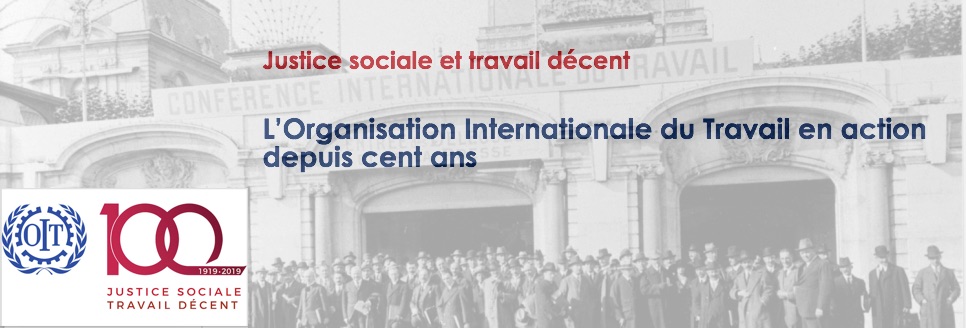Née de la volonté de régulation des relations sociales au sein du capitalisme industriel, l'OIT est, dans les premiers temps de son existence, une organisation européo-centrée. Dès l'origine cependant, elle prétend à l'universalité de son action en faveur de la justice sociale. Les questionnements sur les moyens concrets d'y aboutir se posent aux fonctionnaires qui la dirigent et notamment au premier Directeur du Bureau international du travail, Albert Thomas. Sous son mandat, le BIT se dote de plusieurs instruments visant à rendre universelle l'action d'une organisation en quête de légitimité. Les fonctionnaires sont chargés de missions, d'enquêtes dans divers pays du monde, qui sont autant de moyens d'observations et d'occasions d'établir des réseaux internationaux politiques, syndicaux et patronaux.
Les voyages à travers le monde d'Albert Thomas, qui se définit comme un « juif errant de la politique sociale » sont un de ces instruments. Soucieux de développer une « diplomatie du travail », il se rend dans 39 pays durant son mandat. Sa représentation du monde est influencée tant par sa formation politique que par ses voyages. Intellectuel, historien et homme politique socialiste, il est surtout sensible aux problématiques relatives au travail et au capitalisme industriel. Ces nombreux séjours à travers le monde portent cependant son regard vers de nouvelles problématiques relatives à la production économique et au travail, dans des pays plus faiblement industrialisés, ou en situation coloniale. Cette communication, qui s'appuiera principalement sur le fonds Albert Thomas des archives du BIT, se propose donc d'analyser comment ce défi de l'universalité se posa au premier directeur du BIT. Trois axes pourront être développés.
Dans un premier temps, il s'agira d'analyser la notion d'universalisme dans les premières années de l'organisation. Aux yeux du directeur, c'est plutôt l'absence des deux puissances que sont l'URSS et des Etats-Unis qui grève sa prétention à l'universalité, plutôt que sa réelle implantation dans le monde entier.
L'analyse des principaux voyages effectués par Albert Thomas permet de dégager une « géographie mentale » qui influence la politique menée par l'Organisation. Si celle-ci se concentre principalement sur l'Europe, les voyages menés par le Directeur sur les autres continents – principalement l'Amérique et l'Asie – font émerger de nouvelles problématiques et de nouvelles réflexions (travail forcé, réflexion sur la production et le travail en situation coloniale) qui influenceront durablement l'agenda politique de l'organisation.
Enfin, la crise de 1929 et ses conséquences socio-économiques à l'échelle mondiale donnent lieu à de nouvelles réflexions d'Albert Thomas sur la notion de mondialisation. Perçue comme entraînant une interdépendance croissante des économies nationales, elle doit entraîner une prise de conscience sur la nécessaire collaboration internationale devant permettre de réformer le capitalisme mondial. Observation directe du monde et expertise socio-économique se combinent alors pour penser l'action de l'OIT face à la mondialisation.
English version:
The first director of the ILO and the challenges of globalization and universalism (1919-1932)
Born out of the efforts to regulate social relations within industrial capitalism, the ILO focuses mainly on Europe at the beginning of its existence. However, right from the start, its actions towards achieving social justice have a universal vocation. Questions about the concrete means to achieve universality present themselves to the ILO's officers, in particular the First Director Albert Thomas. Under his mandate, the ILO adopts several tools to extend its actions throughout the world, looking to gain legitimacy. The ILO sends officials in several countries worldwide. They are tasked with information collection and analysis missions in several countries worldwide. The goal of these missions is to establish contacts with political networks, Trade Unions and Employers' Federations.
Albert Thomas defined himself as “the wandering Jew of social policy” and travelled around the world (in 39 countries to be precise). His travels are one of the tools used to extend the ILO's actions. His representation of the world is influenced by his political training as well as by his travels. An intellectual, a historian and a socialist politician, he is particularly interested in the issues of the working-class in the industrial capitalist system. However, his many stays throughout the world bring to his attention new issues relating to production and labour in less industrialized or colonized countries.
This communication is mainly based on the archives of the Thomas's cabinet in the ILO (Geneva). It analyses how the first director of the ILO faced this challenge of universalism. Three axes will be developed.
First, we will analyse the concept of universalism in the first years of the organization. The Director sees the absence of the USSR and the United States as members of the ILO as the main obstacle to its claim to universality, more so than its lack of presence in the rest of the world.
Then, from the analysis of Albert Thomas' main journeys, a “mental map” can be drawn. This map influences the organization's policy. While the ILO focuses mainly on Europe, new issues and fields of study arise from the Director's travels on other continents – mainly America and Asia (about forced labour or production and labour in colonized countries). These new subjects will lastingly influence the organization's policy agenda.
Lastly, facing the 1929 crisis and its socio-economic consequences on a worldwide scale, Albert Thomas develops new thoughts and analyses on the concept of globalization. According to Albert Thomas, the growing interdependence of national economies demonstrates the need for reforming global capitalism. Direct observation of the world and socio-economic expertise are combined to define the ILO's actions in the face of globalization.

 PDF version
PDF version
